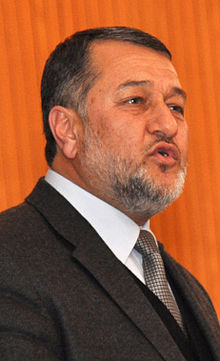Bismillah Khan Mohammadi
Afghan politician From Wikipedia, the free encyclopedia
Bismillah Khan Mohammadi (Persian: بسمالله خان محمدی; born 1961, in Panjshir Province), or Bismillah Khan, is an Afghan politician who served as the defense minister of Afghanistan from 2012 to 2015 and for two months in 2021. From 2002 to 2010, he served as Chief of Staff of the Afghan National Army, and from 2010 to 2012 he held the post of Interior Minister of Afghanistan. He has an anti-Taliban background and once served as a senior commander under Ahmad Shah Massoud. Despite the fall of Kabul to the Taliban in August 2021, Mohammadi claims to remain the minister of defense as part of the government of the National Resistance Front of Afghanistan.[1][2][3]
This article needs to be updated. (August 2021) |
Bismillah Khan Mohammadi | |
|---|---|
 Bismillah Khan in May 2012 | |
| Defense Minister of Afghanistan | |
| In office 19 June 2021 – 15 August 2021 | |
| President | Ashraf Ghani |
| Preceded by | Asadullah Khalid |
| Succeeded by | Abdul Qayyum Zakir (acting) |
| In office 15 September 2012 – 24 May 2015 | |
| President | Hamid Karzai Ashraf Ghani |
| Preceded by | Abdul Rahim Wardak |
| Succeeded by | Abdullah Habibi |
| Minister of Interior | |
| In office 6 January 2010 – 15 September 2012 | |
| President | Hamid Karzai |
| Preceded by | Mohammad Hanif Atmar |
| Succeeded by | Mujtaba Patang |
| Chief of Staff of the Afghan National Army | |
| In office 8 March 2002 – 6 January 2010 | |
| President | Hamid Karzai |
| Succeeded by | Sher Mohammad Karimi |
| Personal details | |
| Born | 1961 (age 63–64) Panjshir, Afghanistan |
| Political party | Jamiat-e Islami |
| Military service | |
| Allegiance | Afghanistan |
| Branch/service | Afghan National Army |
| Rank | General |
| Commands | Chief of Staff of the ANA |
| Battles/wars | War in Afghanistan
United States invasion of Afghanistan Panjshir conflict |
Early years and career
Bismillah Khan Mohammadi was born in 1961 in the Panjshir Province of Afghanistan. An ethnic Tajik, he is the son of Ghausuddin of the Panjshir Valley. After graduating from 14th grade in Abu Hanifa Seminary he enrolled at Kabul Military University. Mohammadi was a former PDPA Parcham member, but after the Soviet invasion of Afghanistan he aligned himself with mujahideen resistance commander Ahmad Shah Massoud.
When the Taliban gained control over large parts of Afghanistan in 1996 establishing their Islamic Emirate of Afghanistan, Bismillah Khan served as Deputy Minister of Defense of the anti-Taliban and still recognized Islamic State of Afghanistan. He was a senior commander in the anti-Taliban resistance, the United Front (Northern Alliance), led by Ahmad Shah Massoud. After the attacks of September 11, 2001, and the subsequent fall of the Taliban regime through United Front ground troops and the U.S. Air Force, Bismillah Khan was appointed commander of Kabul's police force and became a member of the Kabul Security Commission. During that period the security situation in Kabul was better than in other parts of Afghanistan.[4]
Chief of Staff of the Afghan National Army
In 2002, Bismillah Khan became Chief of Staff of the Afghan National Army, a post he held until 2010.[5]
Interior Minister
This biographical article is written like a résumé. (November 2012) |

In June 2010, Bismillah Khan was transferred from his position as Army Chief of Staff to the post of Interior Minister by President Hamid Karzai.[6] As Interior Minister, Mohammadi loudly deplored ethnic fractiousness within the Afghan security forces, stressing national unity and Islamic ethics in the Afghan National Police.
Minister of Defense
Despite the fall of Kabul to the Taliban in August 2021, Mohammadi continued to claim the title of Minister of Defense.
Awards
Bismillah Khan Mohammadi received the Sayed Jamaluddin Afghani, Ghazi Amanullah Khan and Ahmad Shah Baba awards for his efforts in bolstering the Afghan National Army.[7]
References
External links
Wikiwand - on
Seamless Wikipedia browsing. On steroids.
